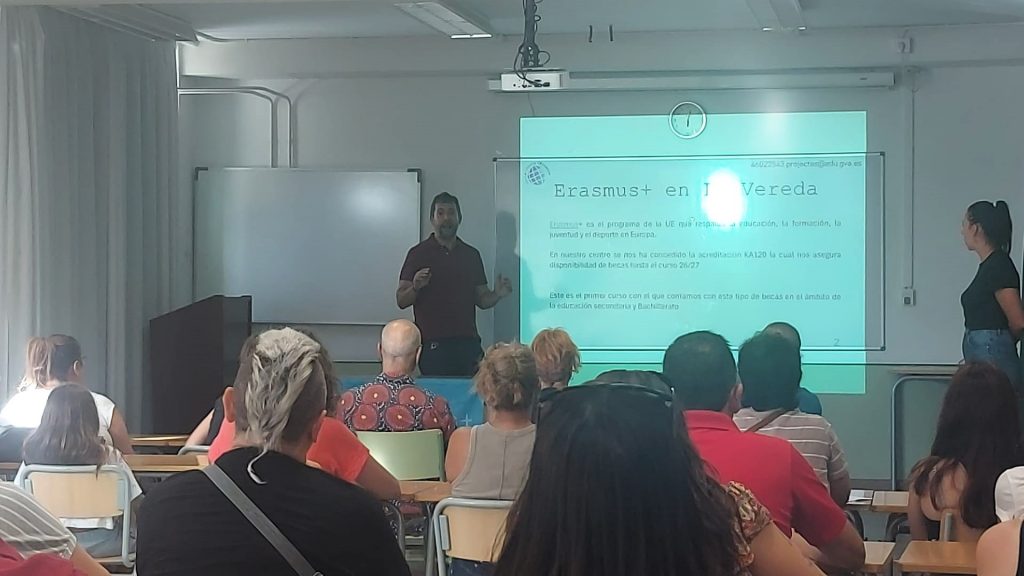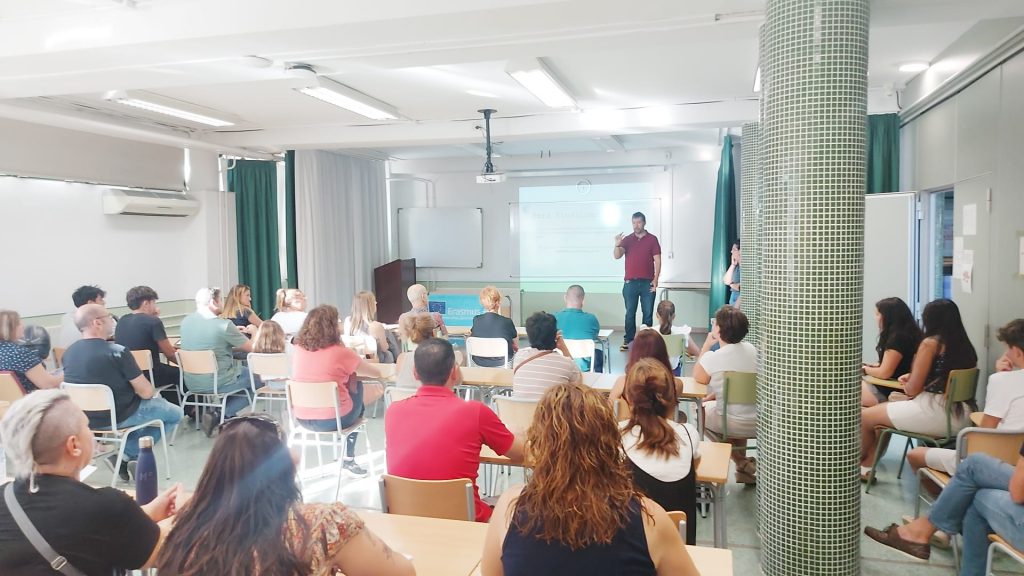El pasado día 26 de septiembre se celebró en el centro, la reunión informativa sobre las becas Erasmus+ SCHOLAR para el alumnado de ESO y Bachillerato.
Este curso contamos con 14 becas, que inicialmente se pretende que sean dos estancias de 7 estudiantes diferentes. En ambas estancias el alumnado estará acompañado por un mínimo de dos miembros del personal del centro.
La duración de las estancias se prevén que sea de 6 días (5 noches) incluyendo el desplazamiento. El alumnado contará con seguro gestionado por el centro que lo cubrirá desde el momento en que inicie el viaje hasta el retorno. La cuantía de la beca se estima en 600€ por alumno (en ella se incluye los gastos de viaje, seguro, manutención y alojamiento).
Aquel alumnado que quiera participar en la movilidad Erasmus+ debe entregar la solicitud en el plazo de convocatoria del 1 al 31 de octubre . Esta solicitud debe incluir un vídeo motivacional de unos 90 segundos con los siguientes aspectos:
• Presentación de la persona candidata.
• Motivos por los que quiere realizar el programa.
• ¿Qué significa Erasmus+ para ti?
• Participación en proyectos del centro (mediación, consejo escolar, etc.).
• Actividades extracurriculares fuera del centro.
Se debe enviar a 46022543.projectes@edu.gva.es con el asunto «Becas Erasmus+ SCH».
La selección de alumnado se realiza por baremo. Siendo los criterios los siguientes:
| Criterio | Baremación |
| Expediente académico del curso anterior (23-24). | 10 |
| Nota de inglés del curso anterior (23-24). | 10 |
| Conocimientos del idioma del país destino, cuando diste del inglés. | 10 |
| Entrevista personal. | 30 |
| Video de presentación. | 15 |
| Valoración docente. | 15 |
| Inclusión social (2 puntos por cada situación considerada como menos oportunidades). | 20 |
| Elementos actitudinales (puntualidad, tolerancia, respeto hacia los demás y al propio centro) | 25 |
| Involucrarse en programas de apoyo y participación escolar (mediación, delegados, patios activos, consejo escolar…) | 20 |
Es obligatorio no haber incurrido en sanciones por mal comportamiento (criterio eliminatorio).
En la valoración docente se tienen en cuenta los siguientes aspectos:
• Actitud (habilidades sociales, actitud positiva, empatía, buena educación).
• Adaptabilidad a nuevas situaciones.
• Predisposición a nuevas experiencias.
• Madurez del alumno/a.
• Capacidad de trabajo y esfuerzo.
Documentación acreditativa de ser alumnado con menos oportunidades
1. DISCAPACIDAD:
A. Certificado de discapacidad emitido por la autoridad correspondiente (CCAA) que presenten una discapacidad reconocida.
B. Se valorará el hecho de tener una solicitud abierta para el reconocimiento de la discapacidad, con informes médicos, psicológicos y psiquiátricos o de entidades sociales.
2. DIFICULTADES EDUCATIVAS Y FORMATIVAS:
A. Informes preceptivos de los equipos de orientación en centros educativos o autoridades y orientación educativa y psicopedagógica de las Delegaciones de educación, y en su caso, tener un protocolo abierto por el centro previo a la solicitud.
3. OBSTÁCULOS SOCIOECONÓMICOS:
A. Ser o haber sido beneficiario de una beca de estudios de carácter general de la Administración General del Estado.
B. Certificado de percepción de prestación de Ingreso mínimo vital / Renta Mínima de Inserción o cualquier otra prestación de igual o similar naturaleza de la unidad familiar o del progenitor que tenga la custodia (en caso de menores), según la denominación adoptada en cada Comunidad Autónoma.
C. Informe de los servicios sociales de la Administración Local que acredite la situación de las personas en riesgo de exclusión social.
D. Familias numerosas o monoparentales.
E. Informe de Servicios Sociales, situaciones de especial necesidad y emergencia social consideradas por la administración pertinente.
F. Consideración administrativa de víctimas de terrorismo, de violencia de género o huérfanos.
G. Certificación de situación de dependencia, participantes con dependientes a cargo.
H. Certificación de ser persona tutelada por la Administración
I. Beneficiario de beca de comedor / libros
J. Acreditación de situación de aquellas personas que no pueden acceder a las prestaciones a las que se hace referencia en la justificación del perfil, por alguna de las siguientes causas: falta del periodo exigido de residencia o empadronamiento o haber agotado el periodo máximo de percepción legalmente establecido.
4. PROBLEMAS DE SALUD:
A. Certificación de situación de salud física que genere la necesidad de apoyo adicional: Informe médico expedido por centro de salud/especialista o la autoridad sanitaria competente.
B. Certificación de situación de salud mental que genere la necesidad de apoyo adicional: Informe de Salud Mental. Informe médico expedido por centro de salud/especialista o la autoridad sanitaria competente.
5. DIFERENCIAS CULTURALES:
A. Resolución de condición de refugiado o con derecho a protección subsidiaria o haber presentado solicitud de protección internacional en España, o en otro país, en caso de estudiantes entrantes.
B. Condición de pertenencia a otra etnia (certificado, en este caso, por servicios sociales).
C. Informe del Departamento de Orientación del centro educativo.
6. DISCRIMINACIÓN:
A. Certificación de la administración competente e Informe del Departamento de Orientación justificando este obstáculo, por ejemplo, por acoso escolar.
Erasmus+ SCHOLAR Scholarships. Call for Applications and SelectionCriteria
On September 26, an meeting was held at the center regarding the Erasmus+ SCHOLAR scholarships for ESO and Baccalaureate students.
This academic year, we have 14 scholarships available, which are initially planned to be divided into two stays for 7 different students each. In both stays, students will be accompanied by a minimum of two members of the center’s staff.
The duration of the stays is expected to be 6 days (5 nights), including travel. Students will have insurance managed by the center, covering them from the moment they start their journey until their return. The scholarship amount is estimated at €600 per student (which includes travel expenses, insurance, meals, and accommodation).
Students wishing to participate in the Erasmus+ mobility must submit their application duringthe application period from October 1 to 31. This application must include a motivationalvideo of about 90 seconds covering the following aspects:
• Presentation of the candidate.
• Reasons for wanting to participate in the program.
• What Erasmus+ means to you.
• Participation in center projects (mediation, school council, etc.).
• Extracurricular activities outside the center.
Applications should be sent to 46022543.projectes@edu.gva.es with the subject line «BecasErasmus+ SCH «
The selection of students will be made through a scoring system based on the followingcriteria:
| Criteria | scoring system |
| Academic Record from the Previous Year (23-24). | 10 |
| English Grade from the Previous Year (23-24). | 10 |
| Knowledge of the Language of the Destination Country, in addition toEnglish. | 10 |
| Personal Interview. | 30 |
| Presentation Video. | 15 |
| Teacher Evaluation. | 15 |
| Social Inclusion (2 points for each situation considered as having fewer opportunities). | 20 |
| Attitudinal Elements (punctuality, tolerance, respect for others and forthe center itself). | 25 |
| Involvement in Support and School Participation Programs (mediation, representatives, active playgrounds, school council, etc.). | 20 |
It is mandatory not to have incurred any sanctions for misconduct (eliminatory criterion).
In the teacher evaluation, the following aspects will be taken into account:
• Attitude (social skills, positive attitude, empathy, good manners).
• Adaptability to new situations.
• Willingness to embrace new experiences.
• Maturity of the student.
• Work capacity and effort.
Documentation Certifying That the Student Has Fewer Opportunities
1.DISABILITY:
A. Disability certificate issued by the corresponding authority (CCAA) that recognizes a disability.
B. Having an open application for disability recognition will be considered, along withmedical, psychological, and psychiatric reports or those from social entities.
2. EDUCATIONAL AND TRAINING DIFFICULTIES:
A. Mandatory reports from orientation teams in educational centers or educational and psychopedagogical authorities of the education delegations, and if applicable, having an open protocol from the center prior to the application.
3. SOCIOECONOMIC OBSTACLES:
A. Being or having been a beneficiary of a general study grant from the General Administration of the State.
B. Certificate of receiving minimum vital income / minimum insertion income or any other similar benefit from the family unit or the parent with custody (in the case of minors), according to the name adopted in each Autonomous Community.
C. Report from local social services certifying the situation of persons at risk of social exclusion.
D. Large families or single-parent families.
E. Report from Social Services regarding special need situations and social emergencies recognized by the relevant administration.
F. Administrative recognition as victims of terrorism, gender-based violence, or orphans.
G. Certification of dependency status for participants with dependents.
H. Certification of being a ward of the Administration.
I. Beneficiary of a meal/books scholarship.
J. Certification of those individuals who cannot access the benefits referred to in the profile justification for any of the following reasons: lack of the required residency or registration period, or having exhausted the maximum legally established period of benefit.
4. HEALTH PROBLEMS:
A. Certification of physical health conditions that require additional support: Medical report issued by a health center/specialist or the competent health authority.
B. Certification of mental health conditions that require additional support: Mental Health report. Medical report issued by a health center/specialist or the competent health authority.
5. CULTURAL DIFFERENCES:
A. Resolution of refugee status or entitlement to subsidiary protection or having applied for international protection in Spain, or in another country, in the case of incoming students.
B. Condition of belonging to another ethnicity (certified, in this case, by social services).
C. Report from the Guidance Department of the educational center.
6. DISCRIMINATION:
A. Certification from the competent authority and a report from the Guidance Department justifying this obstacle, for example, due to bullying.



